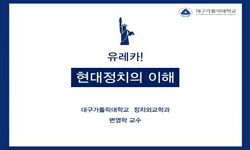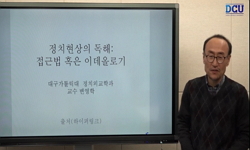Gramsci made a special writing titled 『The Concept of Ideology』. But his ideology concept is emphasizing organic ideology as a synthesis of existing ideology theories and a sort of thought weapon with material force, rather than conceptualization....
http://chineseinput.net/에서 pinyin(병음)방식으로 중국어를 변환할 수 있습니다.
변환된 중국어를 복사하여 사용하시면 됩니다.
- 中文 을 입력하시려면 zhongwen을 입력하시고 space를누르시면됩니다.
- 北京 을 입력하시려면 beijing을 입력하시고 space를 누르시면 됩니다.
https://www.riss.kr/link?id=A5094100
- 저자
- 발행기관
- 학술지명
- 권호사항
-
발행연도
2008
-
작성언어
-
- 주제어
-
KDC
100
-
등재정보
KCI등재
-
자료형태
학술저널
- 발행기관 URL
-
수록면
413-451(39쪽)
- 제공처
-
0
상세조회 -
0
다운로드
부가정보
다국어 초록 (Multilingual Abstract)
Gramsci made a special writing titled 『The Concept of Ideology』. But his ideology concept is emphasizing organic ideology as a synthesis of existing ideology theories and a sort of thought weapon with material force, rather than conceptualization. Possibly, The German Ideology is most significant ideology writing made by Marx and Engels. Here, it reveals negative meanings of ideology well. Gramsci never read this writing, but knew well about negative meanings of ideology, and often used the ideology as negative meaning. On the other hand, Gramsci also uses the ideology as positive(or neutral) meaning. He faced Marx`s Preface to The Critique of Political Economy(1859) and Theses on Feuerbach, which contain some paragraphs that hardly seem to point out only the negative meanings of ideology. However, Gramsci uses ideology as positive meaning, possibly because he was more influenced by Engels and Lenin rather than Marx. Although differences between Marx and Engels are still a subtle issue, it is notable that some of their writings contain positive perspectives on ideology, such as The Holy Family (Marx & Engels), Anti~Duhring(Engels) and Ludwig Feuerbach and End of Classical German Philosophy(Engels). Their perspectives are in common with each other in a sense that superstructure is not automatic reflection of base, but may have reactions to the base. This point had possible influences on Gramsci`s concept of positive ideology. Before successful socialist revolution, in 1894 and 1902, Lenin already attached positive implications to the ideology. In addition to successful socialist revolution, Lenin`s standpoint on ideology came to be more convincing. And Gramsci came to use the ideology as a positive meanings mainly under Lenin`s influence. The concept of Marxist ideology involves a transition from negative implications to positive ones, which also entails the standpoints of Engels and Lenin. As for organic ideology, Gramsci explains that ideology comes to have material force. He accepted the ideology as a sort of influential ideal weapon and put stress on the importance of ideologic struggles, because he would aim to cope with consent acquiring strategy of ruling class and also found that acquiring any counter ideology for subject class is so crucial to acquiring hegemony. Ideology aim for hegemony is the material force of ideology and organic ideology. Gramsci reconstructs the perspectives of Marx, Engels and Lenin selectively in order to acquire this organic ideology. And failure to see Gramsci`s ideology concept in viewpoint of historical bloc, as S. Hall or E. Laclau, might lead to extending only positive aspects of ideology. And ultimately it might be used for structuralism or post-structuralism.
동일학술지(권/호) 다른 논문
-
한국사회에서 공화주의의 이념은 부활할 수 있는가? -공화주의의 정치철학적 고찰-
- 한국철학사상연구회
- 양해림 ( Hae Rim Yang )
- 2008
- KCI등재
-
- 한국철학사상연구회
- 박영균 ( Young Kyun Park )
- 2008
- KCI등재
-
- 한국철학사상연구회
- 김원열 ( Won Yeol Kim )
- 2008
- KCI등재
-
한정 경험의 인식적 함의에 대한 사회철학적 접근 -물신성 개념의 분석을 토대로-
- 한국철학사상연구회
- 백충용 ( Chung Yong Paek )
- 2008
- KCI등재





 KISS
KISS






